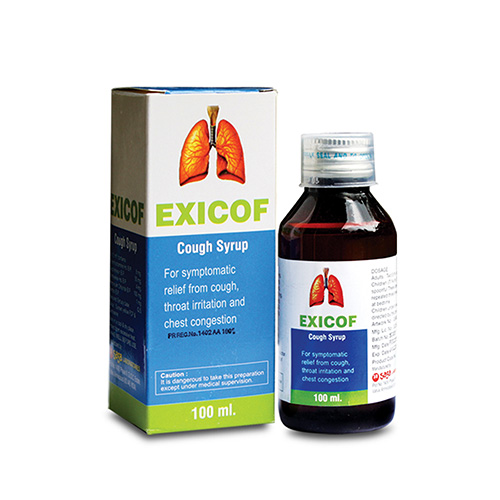
EXICOF Syrup
Therapeutic Class
Cough & Cold Preparations
Indications
It is indicated in cough & other congestive symptoms, for relief in productive & nonproductive cough, in cough associated with laryngitis, pharyngitis, chronic bronchitis & pulmonary congestion.
Chemical Composition
Each 5 ml contains:
Diphenhydramine Hcl B.P. 8 mg.
Guaiphenesin B.P 50 mg.
Bromhexine Hcl B.P 4 mg.
Ammonium Chloride B.P 100 mg.
Menthol B.P. : 1 mg.
Excipients Q.S.
Colour : Sunset Yellow FCF & Carmoisine
Packaging
100 ml / Bot
Dosage & Administration
5 ml 3 - 4 times daily; usually to t.i.d. In children below 6 years, dose may be 2.5 ml 3-4 times daily; OR as directed by physician.
Contraindications
Hypersensitivity
Warning & Precautions
Guaiphenesin should not be given for persistent cough occurring with smoking, asthma or emphysema, or where excessive secretions accompany cough. Bromhexine: Use with care in patients with peptic ulceration. Others: Transient rise in serum aminotransferase. Diphenhydramine: Epilepsy, elderly, urinary and G.I. obstruction, driving, lactation.
Side Effects
Nausea, vomiting, dizziness, headache and rash. CNS depression, paradoxical stimulation (children), dryness of mouth, thickened respiratory section, blurring of vision, constipation, urinary retention, bradycardia followed by tachycardia and arrhythmias, G.I. disturbances, blood dyscrasias.
Drug Interaction
Diphenhydramine administration significantly reduces the absorption of the antituberculous agent pass from the gastrointestinal tract. CNS depressants may potentiate the sedative action of rom the gastrointestinal tract. CNS depressants may potentiate the sedative action of diphenhydramine. Alcohol potentiates the sedative effects of diphenhydramine. Anticholinergic drugs may potentiate diphenhydramine's anticholinergic side effects. Extreme caution should be exercised with patients taking EXICOF in conjunction with nervous system depressants such as alcohol, barbiturates, hypnotics, narcotics analgesic sedatives and tranquillizers and anticholinergic agents and tricyclic antidepressants as their effects may be enhanced by diphenhydramine. Monoamine-oxidase inhibitors may enhance the anticholinergic effects of diphenhydramine hydrochloride. The warning signs of damage caused by ototoxic medicines may be masked by diphenhydramine hydrochloride. Guaiphenesin may increase renal clearance for urate and thereby lower serum uric acid levels. Guaiphenesin may produce an increase in urinary 5-hydroxyindoleacetic acid and may therefore interfere with the interpretation of this test for the diagnosis of carcinoid syndrome. It may also falsely elevate the VMA test for catechols. Administration of this drug should be discontinued 48 hours prior to the collection of urine specimens for such tests. Bromhexine has been known to increases the activity of antibiotics, which can have adverse health effects. Ammonium chloride may increase the serum concentration of aluminum acetylsalicylate. Menthol reduces effect of warfarin.

